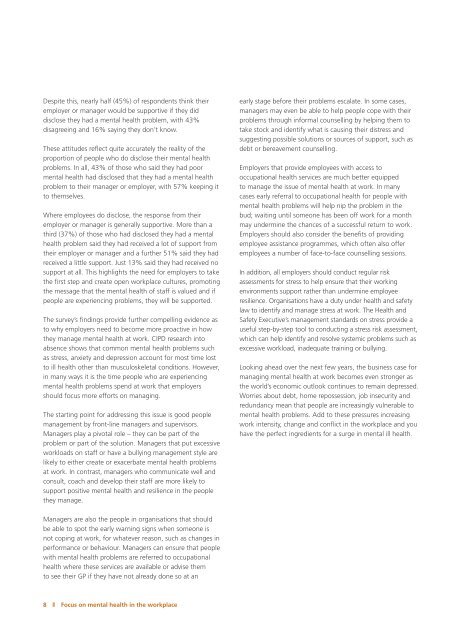Employee Outlook: Focus on mental health in the workplace - Mind
Employee Outlook: Focus on mental health in the workplace - Mind
Employee Outlook: Focus on mental health in the workplace - Mind
- No tags were found...
Create successful ePaper yourself
Turn your PDF publications into a flip-book with our unique Google optimized e-Paper software.
Despite this, nearly half (45%) of resp<strong>on</strong>dents th<strong>in</strong>k <strong>the</strong>iremployer or manager would be supportive if <strong>the</strong>y diddisclose <strong>the</strong>y had a <strong>mental</strong> <strong>health</strong> problem, with 43%disagree<strong>in</strong>g and 16% say<strong>in</strong>g <strong>the</strong>y d<strong>on</strong>’t know.These attitudes reflect quite accurately <strong>the</strong> reality of <strong>the</strong>proporti<strong>on</strong> of people who do disclose <strong>the</strong>ir <strong>mental</strong> <strong>health</strong>problems. In all, 43% of those who said <strong>the</strong>y had poor<strong>mental</strong> <strong>health</strong> had disclosed that <strong>the</strong>y had a <strong>mental</strong> <strong>health</strong>problem to <strong>the</strong>ir manager or employer, with 57% keep<strong>in</strong>g itto <strong>the</strong>mselves.Where employees do disclose, <strong>the</strong> resp<strong>on</strong>se from <strong>the</strong>iremployer or manager is generally supportive. More than athird (37%) of those who had disclosed <strong>the</strong>y had a <strong>mental</strong><strong>health</strong> problem said <strong>the</strong>y had received a lot of support from<strong>the</strong>ir employer or manager and a fur<strong>the</strong>r 51% said <strong>the</strong>y hadreceived a little support. Just 13% said <strong>the</strong>y had received nosupport at all. This highlights <strong>the</strong> need for employers to take<strong>the</strong> first step and create open <strong>workplace</strong> cultures, promot<strong>in</strong>g<strong>the</strong> message that <strong>the</strong> <strong>mental</strong> <strong>health</strong> of staff is valued and ifpeople are experienc<strong>in</strong>g problems, <strong>the</strong>y will be supported.The survey’s f<strong>in</strong>d<strong>in</strong>gs provide fur<strong>the</strong>r compell<strong>in</strong>g evidence asto why employers need to become more proactive <strong>in</strong> how<strong>the</strong>y manage <strong>mental</strong> <strong>health</strong> at work. CIPD research <strong>in</strong>toabsence shows that comm<strong>on</strong> <strong>mental</strong> <strong>health</strong> problems suchas stress, anxiety and depressi<strong>on</strong> account for most time lostto ill <strong>health</strong> o<strong>the</strong>r than musculoskeletal c<strong>on</strong>diti<strong>on</strong>s. However,<strong>in</strong> many ways it is <strong>the</strong> time people who are experienc<strong>in</strong>g<strong>mental</strong> <strong>health</strong> problems spend at work that employersshould focus more efforts <strong>on</strong> manag<strong>in</strong>g.The start<strong>in</strong>g po<strong>in</strong>t for address<strong>in</strong>g this issue is good peoplemanagement by fr<strong>on</strong>t-l<strong>in</strong>e managers and supervisors.Managers play a pivotal role – <strong>the</strong>y can be part of <strong>the</strong>problem or part of <strong>the</strong> soluti<strong>on</strong>. Managers that put excessiveworkloads <strong>on</strong> staff or have a bully<strong>in</strong>g management style arelikely to ei<strong>the</strong>r create or exacerbate <strong>mental</strong> <strong>health</strong> problemsat work. In c<strong>on</strong>trast, managers who communicate well andc<strong>on</strong>sult, coach and develop <strong>the</strong>ir staff are more likely tosupport positive <strong>mental</strong> <strong>health</strong> and resilience <strong>in</strong> <strong>the</strong> people<strong>the</strong>y manage.early stage before <strong>the</strong>ir problems escalate. In some cases,managers may even be able to help people cope with <strong>the</strong>irproblems through <strong>in</strong>formal counsell<strong>in</strong>g by help<strong>in</strong>g <strong>the</strong>m totake stock and identify what is caus<strong>in</strong>g <strong>the</strong>ir distress andsuggest<strong>in</strong>g possible soluti<strong>on</strong>s or sources of support, such asdebt or bereavement counsell<strong>in</strong>g.Employers that provide employees with access tooccupati<strong>on</strong>al <strong>health</strong> services are much better equippedto manage <strong>the</strong> issue of <strong>mental</strong> <strong>health</strong> at work. In manycases early referral to occupati<strong>on</strong>al <strong>health</strong> for people with<strong>mental</strong> <strong>health</strong> problems will help nip <strong>the</strong> problem <strong>in</strong> <strong>the</strong>bud; wait<strong>in</strong>g until some<strong>on</strong>e has been off work for a m<strong>on</strong>thmay underm<strong>in</strong>e <strong>the</strong> chances of a successful return to work.Employers should also c<strong>on</strong>sider <strong>the</strong> benefits of provid<strong>in</strong>gemployee assistance programmes, which often also offeremployees a number of face-to-face counsell<strong>in</strong>g sessi<strong>on</strong>s.In additi<strong>on</strong>, all employers should c<strong>on</strong>duct regular riskassessments for stress to help ensure that <strong>the</strong>ir work<strong>in</strong>genvir<strong>on</strong>ments support ra<strong>the</strong>r than underm<strong>in</strong>e employeeresilience. Organisati<strong>on</strong>s have a duty under <strong>health</strong> and safetylaw to identify and manage stress at work. The Health andSafety Executive’s management standards <strong>on</strong> stress provide auseful step-by-step tool to c<strong>on</strong>duct<strong>in</strong>g a stress risk assessment,which can help identify and resolve systemic problems such asexcessive workload, <strong>in</strong>adequate tra<strong>in</strong><strong>in</strong>g or bully<strong>in</strong>g.Look<strong>in</strong>g ahead over <strong>the</strong> next few years, <strong>the</strong> bus<strong>in</strong>ess case formanag<strong>in</strong>g <strong>mental</strong> <strong>health</strong> at work becomes even str<strong>on</strong>ger as<strong>the</strong> world’s ec<strong>on</strong>omic outlook c<strong>on</strong>t<strong>in</strong>ues to rema<strong>in</strong> depressed.Worries about debt, home repossessi<strong>on</strong>, job <strong>in</strong>security andredundancy mean that people are <strong>in</strong>creas<strong>in</strong>gly vulnerable to<strong>mental</strong> <strong>health</strong> problems. Add to <strong>the</strong>se pressures <strong>in</strong>creas<strong>in</strong>gwork <strong>in</strong>tensity, change and c<strong>on</strong>flict <strong>in</strong> <strong>the</strong> <strong>workplace</strong> and youhave <strong>the</strong> perfect <strong>in</strong>gredients for a surge <strong>in</strong> <strong>mental</strong> ill <strong>health</strong>.Managers are also <strong>the</strong> people <strong>in</strong> organisati<strong>on</strong>s that shouldbe able to spot <strong>the</strong> early warn<strong>in</strong>g signs when some<strong>on</strong>e isnot cop<strong>in</strong>g at work, for whatever reas<strong>on</strong>, such as changes <strong>in</strong>performance or behaviour. Managers can ensure that peoplewith <strong>mental</strong> <strong>health</strong> problems are referred to occupati<strong>on</strong>al<strong>health</strong> where <strong>the</strong>se services are available or advise <strong>the</strong>mto see <strong>the</strong>ir GP if <strong>the</strong>y have not already d<strong>on</strong>e so at an8 <str<strong>on</strong>g>Focus</str<strong>on</strong>g> <strong>on</strong> <strong>mental</strong> <strong>health</strong> <strong>in</strong> <strong>the</strong> <strong>workplace</strong>
















